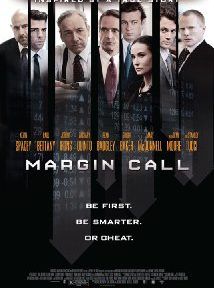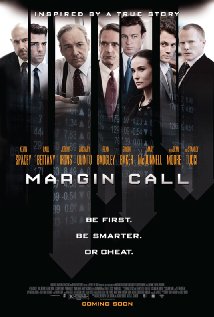
“Margin Call”–Soulless Capitalism at Its Finest

An onslaught of “Occupy Wall Street” movies has been released in the last two years–think “Wall Street: Money Never Sleeps”, “Too Big to Fail”, “Up in the Air”, The Company Men”–in the wake of the financial meltdown of 2008. “Margin Call” deserves to be among the classics, which have focused on greed, power, and the vacuum resulting from gutting regulatory compliance. (My favorite among recent classics is “Glengarry Glen Ross”.)
The brainchild of director and screenwriter, J.C. Chandor, “Margin Call” is a slowly unfolding narrative about a risk management analyst, Eric Dale (beautifully played by Stanley Tucci), on his way out of corporate America along with eighty percent of an unnamed broker/dealer (=Lehman Brothers??) who must lay off all but the most ambitious (and ruthless) employees. Tucci’s character hands off a flash drive to a young analyst, Peter Sullivan (the remarkable Zachary Quinto of “Heroes” and “Star Trek” fame). Sullivan is left with the unenviable task of realizing that the broker/dealer he works for is over-leveraged, based on faulty assumptions of a proprietary predictive algorithm for mortgage securities. How timely is that?!
In an impeccable cast including Demi Moore as the embittered woman executive who has played by all the rules in a male-dominated company only to be the scapegoat, Kevin Spacey owns this movie. While there are portraits of a range of power players all trying to survive in a game where only a few can continue to triumph, Kevin Spacey’s character, Sam Rogers, is the conflicted, morally ambivalent trading floor manager whose curdling resentment of where he is and what he must do results in a deeply tragic, heartbreakingly lonely figure.
John Tuld (=Fuld of Lehman Brothers perhaps), the CEO, denies that disastrous speculation is the death of his company. In a brilliant, riveting scene Tuld (the almost-always villainous Jeremy Irons) announces the firm has no choice but to liquidate its mortgage securities by the end of the next trading day — a strategy that will destroy the financial well-being of millions of Americans in the process. There is no moral–only a logistical– dilemma for the corporation. How to avoid a devastating margin call translates to how fast can they dump the worthless paper they have been holding before word gets out on the street? They frantically start selling to customers knowing that what they are selling is worthless.
Although the film belongs to Spacey, Irons faces Spacey and indifferently mutters: “It’s all just the same thing over and over; we can’t help ourselves. And you and I can’t control it, or stop it, or even slow it. Or even ever-so-slightly alter it. We just react. And we make a lot of money if we get it right. And we get left by the side of the road if we get it wrong. And there have always been and there always will be the same percentage of winners and losers. Happy foxes and sad sacks. Fat cats and starving dogs in this world. Yeah, there may be more of us today than there’s ever been. But the percentages-they stay exactly the same.”
Those may be the most memorable, debilitating and cold-blooded lines to ring in your ears long after the film has ended. I can’t stop thinking about them!

My Top Ten Movies for 2011–Reviewed, Not Necessarily New | Unhealed Wound
[…] Margin Call (December – Among the excellent films and documentaries about the 2008 financial meltdown, this one […]
Janet Yoshikawa
Sounds like a great movie! Hey Diana -I don’t think I’ve ever mentioned how much I like your unhealed wound logo/graphic – bold, colorful, and a little rough, very cool. That’s my big sis!
Gayle
I can’t wait to see this movie…I love Kevin Spacey,ever since he played that toe sucking creepy guy on a television show I can’t even recall! And this type of story, ie Glengarry Glen Ross is right up my alley too!
I wonder how the history books will describe this time of our lives…the greed shown here has affected the entire planet!
Keep writing Diana…you are a very good read!
Evelyn klein
Your story is compelling enough to make me want to see this movie.
It seems to stand out amongst the bunch of movies on the downturn of our economy.
Great write up, as usual!
Evelyn